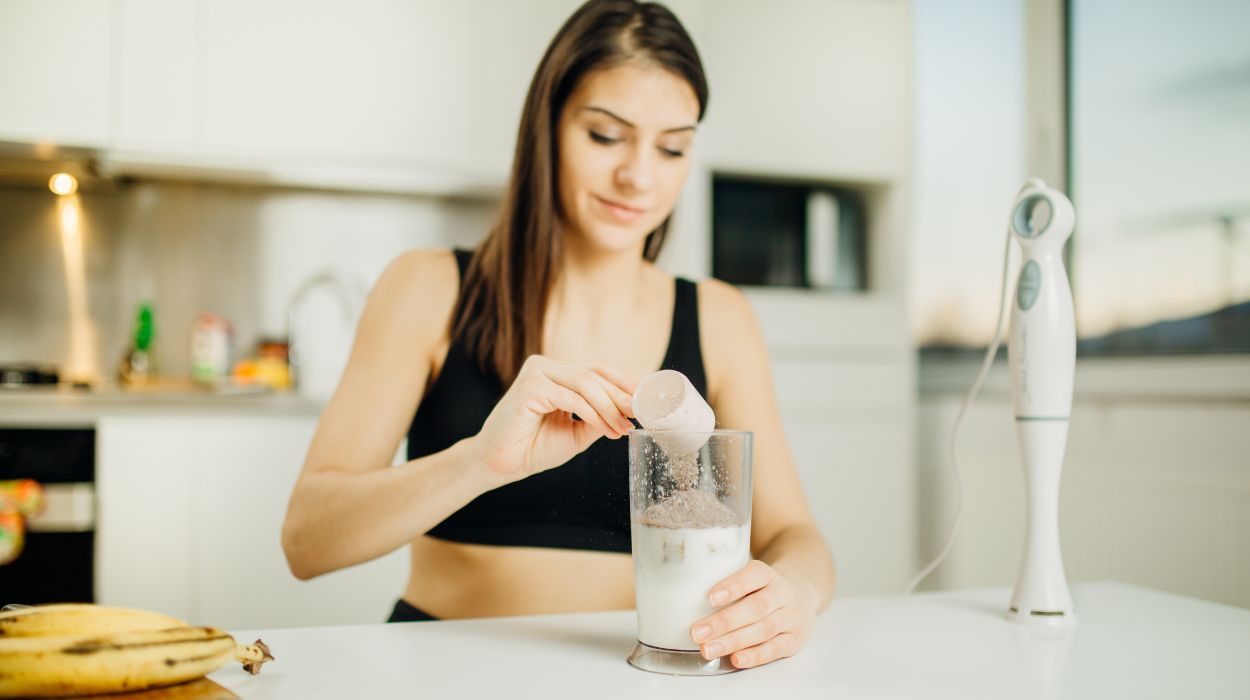 Expert's opinion
Expert's opinion
Expert's opinion
The article is a subjective view on this topic written by writers specializing in medical writing.
It may reflect on a personal journey surrounding struggles with an illness or medical condition, involve product comparisons, diet considerations, or other health-related opinions.
Although the view is entirely that of the writer, it is based on academic experiences and scientific research they have conducted; it is fact-checked by a team of degreed medical experts, and validated by sources attached to the article.
The numbers in parenthesis (1,2,3) will take you to clickable links to related scientific papers.
Is Creatine Vegan? Is It Worth Using It In 2024?

Creatine[1] is an amino acid derivative that can be found in the skeletal muscle. It can be found in foods from animal sources like meats and dairy. The creatine compound plays a role in energy creation in our bodies.
If you have hit the gym at some point, you may have heard of creatine supplements. Creatine is a popular and generally safe supplement commonly used as a physical performance enhancer. Athletes who follow a vegan diet may also show interest in using a supplement to achieve similar results. This is why we look to answer the question: is creatine vegan?
Is Creatine Vegan-Friendly?
Yes. Creatine food sources are mainly animal-based foods like meats, poultry, fish, eggs, and dairy. On the other hand, supplements like creatine monohydrate can be vegan. To figure out if the product you are purchasing is vegan-friendly, make sure to read the label, or if needed, contact the manufacturer. To help your body synthesize creatine, consume some plant-based proteins, such as nuts and legumes, which will be a source of the amino acids needed to form it.
Reasons Vegans Should Take Creatine

Vegan athletes[2] have been found to have lower stored levels of creatine in their muscles, serum, plasma, and red blood cells, but not in the brain. This is most likely due to decreased dietary intake of creatine food sources, like dairy and eggs. Supplementation with creatine has been found to improve performance in athletes following a vegan diet.
People following a vegan diet tend to eat more fruits and vegetables and fewer calories. This is why you must eat enough food to fuel your body for exercise or intense work. Creatine can provide an extra boost to your workouts and let you work out a bit longer.
Good planning of the vegan diet is important to consume adequate amounts of vitamins and minerals. Particularly important is to prevent vitamin B12 deficiency[2] which has been linked with impaired methionine production, an amino acid. Methionine, if impaired, may lead to lower production of creatine by our bodies. If you need help with your meal planning, consider a vegan meal delivery service.
If you find your vegan diet is lacking either fruits or vegetables, you may consider consuming green powders. A multivitamin and multimineral supplement may also be required to prevent other deficiencies.
What Is Creatine?
Creatine is a non-protein compound found in our bodies, mainly 95% is stored in skeletal muscles. It has a role in energy metabolism,[3] as it participates in the production of adenosine triphosphate or ATP, our energy unit currency. This is particularly important when our muscles need to perform intense effort.
When our bodies start running out of ATP, creatine comes to the rescue, allowing you to work out for longer.
In an omnivorous diet, we may consume around 1 gram of creatine while our body creates around one additional gram. Dietary creatine can be found naturally in foods like poultry, eggs, seafood, beef, pork, and milk. In vegan diets, creatine can be manufactured in the body from eating nuts and legumes. By following a balanced and healthy diet, you may be consuming enough creatine daily.
Creatine Health Benefits

Creatine supplementation has been studied substantially for its possible health benefits and sports performance improvement. Some examples[4] of the benefits of creatine supplementation are:
- Improves sports performance. It can help increase muscle performance[5] in high-intensity but short-duration exercises in amounts of 3 grams/day. Sports or exercises like sprinting benefit from creatine supplementation.
- Increases strength. Creatine may facilitate strength improvement.
- Prevents sarcopenia. A meta-analysis[3] on creatine supplementation noted that it may be able to support increased muscle mass in healthy aging men following a resistance weight training protocol.
- May reduce soreness. Creatine supplementation may attenuate post-workout inflammation from muscle damage, helping reduce soreness and maybe support recovery.
Creatine has been studied for the management of depression symptoms,[6] fatigue, and cramps. There are also studies looking to find if creatine supplementation can be used to prevent or treat heart failure[7] and improve short-term memory,[8] but more research and evidence are needed.
Creatine supplementation needs to be avoided during pregnancy when suffering from kidney disease or bipolar disorder since it may worsen symptoms. People with Parkinson’s disease need to take precautions when using creatine and adding caffeine.
How To Add Creatine To Your Vegan Lifestyle
There are no vegan food sources for creatine. And most creatine supplements are not meant for vegans. As mentioned above, people who follow vegan and vegetarian diets have fewer creatine stores[9] in their bodies.
Luckily, our bodies can synthesize creatine from other essential amino acids to support part of what is not consumed. Even so, you may have less creatine in your body due to a lower dietary intake and may benefit from a supplement.
Read The Product Label
The best way to find out if a creatine supplement is not made from animal sources is by researching the product. Also, read the label for the vegan claim to find out if it’s a suitable option. Alternatively, you can follow this link for some alternatives to vegan creatine supplements.
You may find in the stores that creatine monohydrate is the most common and studied form. This makes us wonder if oral creatine monohydrate supplementation can also be vegan. The short answer is yes; vegan alternatives may meet your lifestyle.
Pair It
Consume your creatine supplement with a carbohydrate or a mixed carb-protein source.[10] This approach will increase creatine retention in the muscle creatine levels. Consider mixing your creatine powder with oat milk and peanut butter. You can also take your creatine close to your meal, like rice with tofu or beans. Fruits like a banana would be a simple snack that can help your body take up creatine.
Dosing
There are a couple of dosing methods for starting creatine supplements. First off is creatine loading, where you can use 20 grams daily for 5-7 days to increase intramuscular creatine quickly. Follow with a maintenance dose of 3-5 grams of creatine daily for up to 16 weeks.
Another option is a lower dose of 3-5 grams daily over four weeks. This will also offer the benefits of increased muscle performance.
Creatine supplementation can be safe to use long-term. It has been used in doses of up to 10 grams for up to 5 years. Discuss with your healthcare provider. Side effects that have been reported include dehydration, muscle cramps, and upset stomach.
Caffeine may affect the performance-boosting effect of creatine. You might consider taking creatine separately or avoiding caffeine altogether.
Final Thoughts
People who follow a vegan or vegetarian diet have lower muscle creatine stores. Creatine supplements may be of more benefit to people following a vegan diet. Consider a creatine supplement if you are looking to improve sports performance and sports nutrition position stand.
If you are still wondering if creatine is vegan-friendly, the answer is yes, it can be. You will find there are vegan creatine alternatives in the market. It is important to look at the label for the specification of vegan or its avoidance of animal products.
Frequently Asked Questions
Creatine monohydrate[4] is synthesized in a laboratory by using sarcosine and cyanamide and adding a chemical catalyst. These compounds and chemicals vary from animal or plant materials.
Yes. Creatine supplements can be vegan-friendly. However, read labels as some manufacturers may use animal-based products. Make sure to look for the vegan claim on the label or product website.
+ 10 sources
Health Canal avoids using tertiary references. We have strict sourcing guidelines and rely on peer-reviewed studies, academic researches from medical associations and institutions. To ensure the accuracy of articles in Health Canal, you can read more about the editorial process here
- Hall, M., Manetta, E. and Tupper, K. (2021). Creatine Supplementation: An Update. [online] 20(7), pp.338–344. doi:https://doi.org/10.1249/jsr.0000000000000863.
- Kaviani, M., Shaw, K.A. and Chilibeck, P.D. (2020). Benefits of Creatine Supplementation for Vegetarians Compared to Omnivorous Athletes: A Systematic Review. [online] 17(9), pp.3041–3041. doi:https://doi.org/10.3390/ijerph17093041.
- Balestrino, M. and Adriano, E. (2019). Beyond sports: Efficacy and safety of creatine supplementation in pathological or paraphysiological conditions of brain and muscle. [online] 39(6), pp.2427–2459. doi:https://doi.org/10.1002/med.21590.
- Kreider, R.B., Ralf Jäger and Purpura, M. (2022). Bioavailability, Efficacy, Safety, and Regulatory Status of Creatine and Related Compounds: A Critical Review. [online] 14(5), pp.1035–1035. doi:https://doi.org/10.3390/nu14051035.
- Kreider, R.B., Kalman, D.S., Antonio, J., Ziegenfuss, T.N., Wildman, R., Collins, R.L., Candow, D.G., Kleiner, S.M., Almada, A.L. and Hector Sanchez Lopez (2017). International Society of Sports Nutrition position stand: safety and efficacy of creatine supplementation in exercise, sport, and medicine. [online] 14(1). doi:https://doi.org/10.1186/s12970-017-0173-z.
- Forbes, S.C., Cordingley, D.M., Cornish, S.M., Gualano, B., Roschel, H., Ostojic, S.M., Rawson, E.S., Roy, B.D., K.P. Prokopidis, Giannos, P. and Candow, D.G. (2022). Effects of Creatine Supplementation on Brain Function and Health. [online] 14(5), pp.921–921. doi:https://doi.org/10.3390/nu14050921.
- Balestrino, M. (2021). Role of Creatine in the Heart: Health and Disease. [online] 13(4), pp.1215–1215. doi:https://doi.org/10.3390/nu13041215.
- Roschel, H., Gualano, B., Ostojic, S.M. and Rawson, E.S. (2021). Creatine Supplementation and Brain Health. [online] 13(2), pp.586–586. doi:https://doi.org/10.3390/nu13020586.
- Pohl, A., Frederik Schünemann, Käthe Bersiner and Gehlert, S. (2021). The Impact of Vegan and Vegetarian Diets on Physical Performance and Molecular Signaling in Skeletal Muscle. [online] 13(11), pp.3884–3884. doi:https://doi.org/10.3390/nu13113884.
- Wax, B., Kerksick, C.M., Jagim, A.R., Mayo, J.J., Lyons, B.D. and Kreider, R.B. (2021). Creatine for Exercise and Sports Performance, with Recovery Considerations for Healthy Populations. [online] 13(6), pp.1915–1915. doi:https://doi.org/10.3390/nu13061915.



